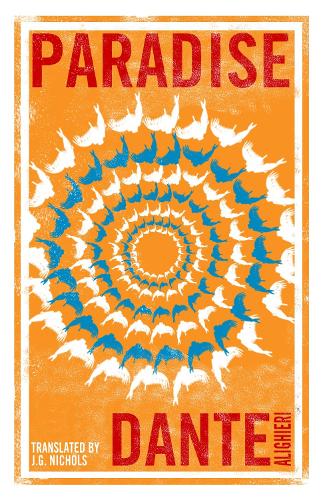
Paradise: Dual Language and New Verse Translation
(Paperback)
Publishing Details
Paradise: Dual Language and New Verse Translation
By (Author) Dante Alighieri
Translated by J.G. Nichols
Alma Books Ltd
Alma Classics
1st July 2017
25th May 2017
United Kingdom
Classifications
General
Non Fiction
Poetry / poems by individual poets
851.1
Physical Properties
Paperback
422
Width 128mm, Height 194mm, Spine 28mm
320g
Description
In the third and final part of The Divine Comedy, Dante recounts his journey through heaven, after the travails and torments of Hell and the arduous ascent of Mount Purgatory, creating a cosmology of the highest realm of creation which is astonishing in its complexity. In Dantes imagining, Paradise is formed out of concentric spheres surrounding the Earth, beginning with the Moon and ending with the Empyrean. Dante must traverse these ethereal regions guided by his beloved Beatrice, as a means of attaining wisdom, revelation and beatitude. Containing some of Dantes finest poetry, Dantes Paradise is an enduring vision of grace and a powerful allegory for the struggle for redemption. This dual-text edition completes J.G. Nicholss masterful verse translation of The Divine Comedy.
Reviews
This new translation by J.G. Nichols, clearly grounded in a secure knowledge of and familiarity with Dante and in English verse which is rarely less than competently handled, is one that deserves to be taken seriously and will reward any reader who makes his first encounter with Dante through it. It is an intelligent and sophisticated piece of work. * Acumen Literary Journal *
Dante is my spiritual food. -- James Joyce
Bravo for this new version of Dante... Bravo, Professor Nichols! * The Church Times *
All life is written in Dantes burning pages, and Nichols has done him proud. -- Ian Thomson * The Observer *
For sheer liveliness, combined with accuracy and closeness to the text, it will be hard to rival. -- A.N. Wilson
Author Bio
Born in Florence, Dante Alighieri (12651321) is considered to be the father of Italian poetry and one of the greatest influences in world literature. His masterpiece, The Divine Comedy, is the zenith of medieval knowledge and a paragon of poetic imagination. Its first part, the Inferno, remains one of the most popular books of all time.
